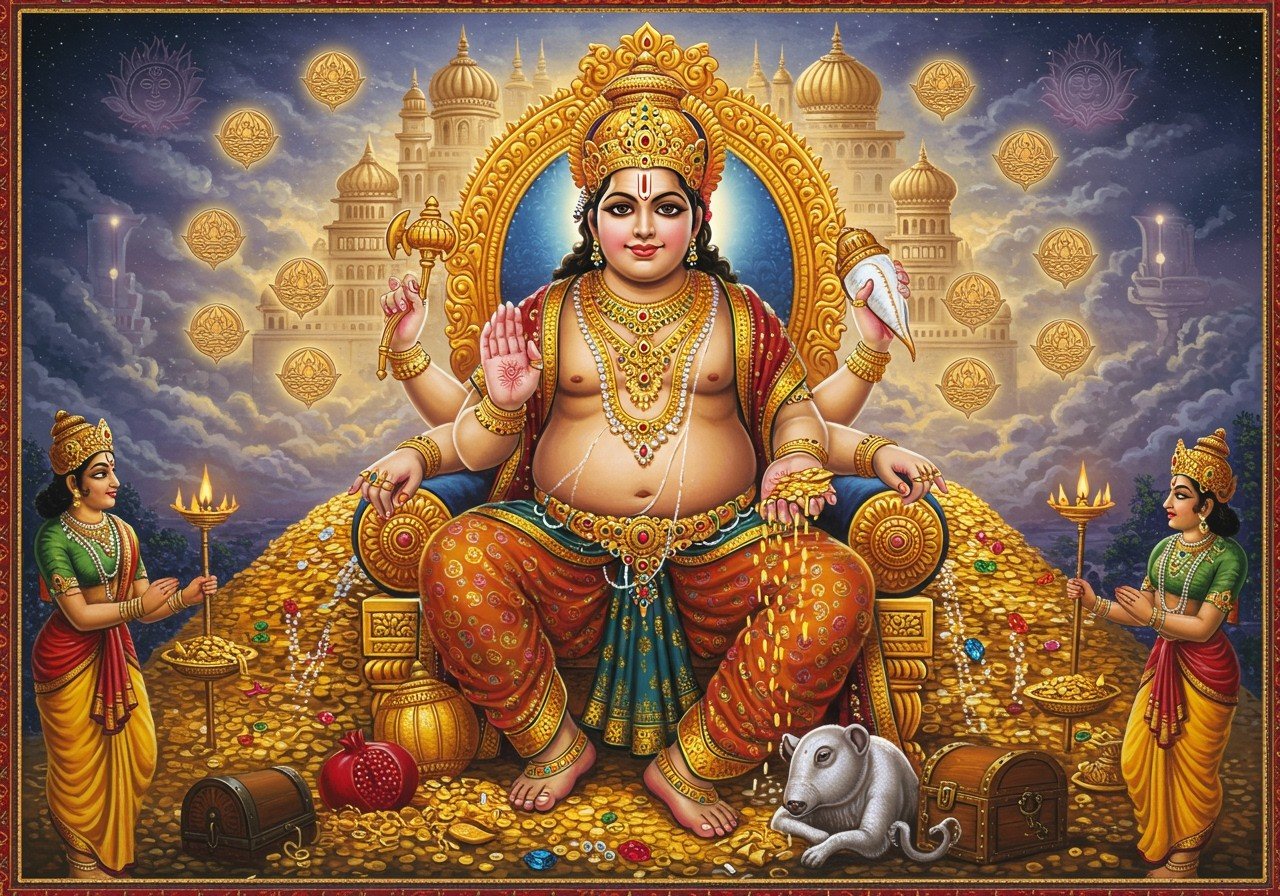
In Hindu mythology, Kubera’s journey from a mortal king to the revered God of Wealth is truly captivating. His story, deeply intertwined with Indian traditions and rituals, emphasizes his enduring influence on wealth and prosperity. Understanding Kubera’s legacy offers valuable insights into how cultural beliefs continue to shape lives today.
The Origins of Kubera
Kubera’s early life is rooted in a rich lineage. Born to the sage Vishrava and celestial being Ilavida, he hails from a family of Brahmin sages, adding depth to his character as a deity. He was initially the benevolent king of Lanka, ruling over a prosperous and thriving kingdom. Lanka, renowned in mythology for its opulence and strategic importance, played a key role in Kubera’s story. His just rule laid the foundation for his later transformation into a deity revered for wealth and prosperity.
The Story of Kubera’s Wealth
Kubera’s wealth is a tale of divine abundance. Known as the God of Wealth, he possesses treasures beyond human comprehension. His legend features the Pushpaka Vimana, a magical flying chariot, symbolizing his heavenly riches. This chariot, capable of instant transportation, emphasizes Kubera’s status as a custodian of celestial wealth. Moreover, the Nidhis, a collection of nine treasures, further solidify Kubera’s association with prosperity. Representing success, abundance, and good fortune, these treasures signify more than just material wealth. Kubera’s guardianship of the Nidhis underscores his role in distributing wealth to those who venerate him with sincerity.
Kubera and the Acquisition of Lanka
Kubera once reigned over the magnificent kingdom of Lanka, his rule characterized by prosperity and fairness. However, a familial conflict dramatically altered his destiny. Ravana, Kubera’s half-brother, usurped the throne through deceit and force. This pivotal moment forced Kubera to relinquish Lanka, a turning point in his narrative. He subsequently retreated to Alakapuri, a city of unparalleled beauty and wealth nestled in the Himalayas. This new abode symbolized a fresh start after his loss, showcasing Kubera’s resilience and ability to create prosperity even in the face of adversity. Alakapuri itself serves as a testament to Kubera’s enduring power and influence.
Kubera in Hindu Mythology and Rituals
Kubera’s influence permeates Hindu mythology and rituals. As the treasurer of the gods, he plays a vital role in numerous epics and Puranas. His interactions with other deities underscore his importance in celestial affairs. Kubera is often depicted with a distinctive pot-bellied figure, symbolizing abundance and affluence. Festivals such as Dhanteras during Diwali honor Kubera, with devotees seeking his blessings for prosperity and protection. Rituals dedicated to him emphasize the cultural significance of wealth and generosity. These traditions reflect a deep-seated belief in Kubera’s power to bestow riches upon his followers. Beyond material wealth, these practices also represent the pursuit of spiritual growth and balance.
Kubera’s Influence in Modern Times
Even in contemporary culture, Kubera remains a potent symbol of wealth and fortune. Modern temples and households continue to worship him for financial stability and success. His mythology continues to inform current financial practices, such as the use of Kubera Yantras to attract prosperity. For many culturally rooted Indians, Kubera’s story resonates with their desire to blend tradition with modern convenience. His narrative offers guidance in navigating the complexities of wealth and spirituality in today’s world. This enduring relevance ensures that Kubera’s legacy continues to enrich lives in various ways.
Shop Kubera Ritual Items at Poojn.in
Poojn.in offers authentic items for Kubera worship to attract wealth and prosperity. The online store stocks pure copper Yantra for Kubera, essential for proper ritual worship. You can find Kubera idols made from quality materials like brass and copper that align with traditional specifications. The store also provides complete Kubera puja sets containing all necessary items like incense, flowers, and special offerings. For those seeking wealth blessings, Poojn.in’s Kubera-related products are carefully selected by experts to ensure ritual authenticity. All items are securely packaged to maintain their sacred nature during delivery across India. Visit Poojn.in to explore the full range of Kubera worship materials and have them delivered to your doorstep.
Conclusion: Embracing Kubera’s Legacy
Kubera’s story is a timeless odyssey from the golden halls of Lanka to the celestial city of Alakapuri. His tale of wealth, resilience, and divine stewardship continues to resonate with many. As the God of Wealth, Kubera embodies the virtues of abundance, prosperity, and the significance of generosity. In the modern world, his legacy endures through rituals, festivals, and everyday practices. By honoring Kubera, individuals seek more than just material riches; they aspire to a life of balance, success, and spiritual fulfillment. Kubera’s teachings emphasize that true wealth lies in the harmony between tradition and progress, reminding us that prosperity is a blessing meant to be shared. His influence encourages a balanced approach to life, integrating material well-being with spiritual growth.
FAQs on Kubera
How did Kubera become rich? Kubera attained his wealth through his unwavering devotion and penance to Lord Brahma. Impressed by his dedication, Brahma bestowed upon him the boon of immense wealth, appointing him treasurer of the gods. His riches are also intrinsically linked to his association with the legendary city of Lanka, a place of immense prosperity and power.
How did Kubera get Lanka? Lanka was gifted to Kubera by his grandfather, Brahma, after its initial construction by the divine architect Vishwakarma. However, Kubera’s reign over Lanka eventually ended when his half-brother, Ravana, seized the kingdom after performing intense penance and receiving boons from Lord Shiva. This event marked a significant turning point in Kubera’s story, leading him to establish his new kingdom in Alakapuri.
What is Kubera’s history? Kubera’s history begins as the son of Sage Vishrava and Ilavida. Renowned for his piety and devotion, he earned the favor of Lord Brahma and was appointed as the god of wealth. He ruled over the Yakshas and Kinnaras, establishing his magnificent city, Alaka, near Lord Shiva’s abode on Mount Kailash. His story reflects a blend of devotion, power, and resilience.
Why is Kubera worshipped as the god of wealth? Kubera is venerated as the god of wealth due to his divine role as treasurer. He is believed to bestow prosperity and abundance upon those who worship him. Rituals and prayers dedicated to Kubera are performed to attract wealth and ensure financial stability, reflecting his continued importance in Hindu beliefs and practices.
What is Kubera’s significance in Hindu mythology? In Hindu mythology, Kubera holds immense significance as the guardian of wealth, representing prosperity and abundance. He is one of the eight Lokapalas, the protectors of the world. His presence in mythological narratives symbolizes the essential balance between material wealth and spiritual growth. Kubera’s story underscores the importance of both worldly success and inner peace.
Is Kubera associated with any particular day for worship? Fridays are considered particularly auspicious for worshipping Kubera and seeking his blessings for prosperity. Special prayers and rituals dedicated to him are also performed during Diwali, especially on Dhanteras and Akshaya Tritiya, highlighting his continued importance in Hindu festivals and traditions.
What are some symbols of Kubera? Kubera’s iconography typically depicts him as a plump figure with a prominent potbelly, symbolizing abundance and prosperity. He is often shown carrying a money bag or a mongoose, both representing wealth. His mount, the Pushpaka Vimana, is a flying chariot signifying his celestial authority and power over riches.


